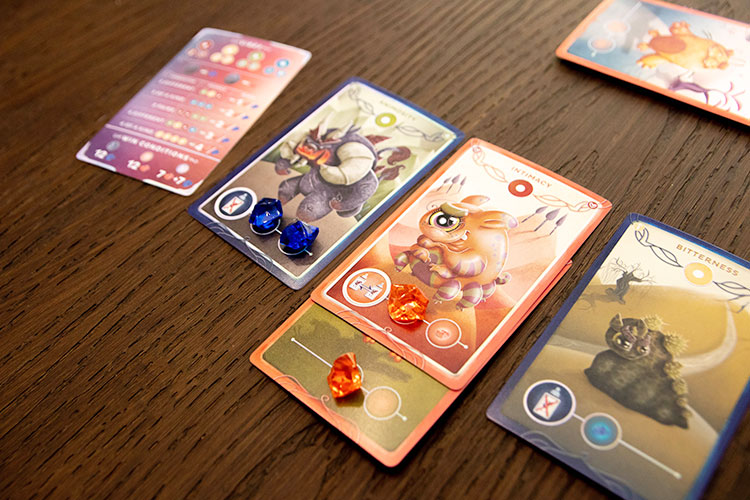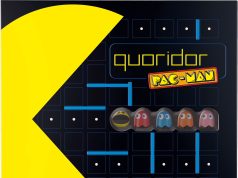 Recently we took a look at the immensely heavy area control game, Cerebria: The Inside World. But when it comes to games about human emotions, Mindclash didn’t stop at just one. Cerebria: The Card Game is set in the same universe and uses similar art to provide a different experience. You will still be balancing forces of bliss and gloom as you try to develop your own mindset, but this time you’ll do in using cards and take-that mechanisms.
Recently we took a look at the immensely heavy area control game, Cerebria: The Inside World. But when it comes to games about human emotions, Mindclash didn’t stop at just one. Cerebria: The Card Game is set in the same universe and uses similar art to provide a different experience. You will still be balancing forces of bliss and gloom as you try to develop your own mindset, but this time you’ll do in using cards and take-that mechanisms.
Cerebria: The Card Game is a hand management and take that card game for 2-5 players. It plays in about 20-30 minutes. It plays best with 3 players.
Gameplay Overview:
Cerebria: The Card Game revolved around three stacks of cards in the center of the table which the game refers to as the Impulse. There is one card from each stack revealed and, on a player’s turn, they can choose to draw these emotion cards from the Impulse or play an emotion card to their tableau (mindset). Each player is limited to four emotion cards in front of them at any given time.

Emotion cards have a variety of important factors that players will have to consider. Each emotion belongs to either the bliss or gloom identity and also has a certain colored “vibe” associated to it. Most cards will store one or two fragments of its identity on the card when it is played. Fragments can be kept on the card and banked when scoring is triggered or spent to activate the special ability of that emotion.
Most of those special abilities involve messing with the other players. You can move around their identity fragments or change the emotion cards in their tableau. Doing so comes at a cost—the fragments you must spend to activate the ability is what you need to win the game—but can really mess heavily with the plans of your opponents. If you are targeted by another player’s action, any player can discard an emotion from their hand with a matching vibe to prevent that effect, allowing players to give themselves at least a small amount of protection.
The round ends when the final card is drawn from any of the impulse stacks. In addition to being able to score the fragments on the cards in your tableau, players will score additional points for creating poker-like sets of vibe cards. If all four of the cards in your tableau are from the same vibe, for instance, you’ll get an extra 4 bonus fragments. After a scoring round if any player has 12 fragments of an identity (a single-minded victory) or 7 of bliss and 7 of gloom (a balanced mindset) they win the game.

Game Experience:
Cerebria: The Card Game certainly makes good use of the mindset theme and uses some of the amazing artwork from the great production that brought us Cerebria: The Inside World. Despite being very different games in mechanisms, scope, and length, there are actually some similarities that come through between the card and board versions; mostly around how scoring is triggered and the importance of timing your actions carefully.
Combining the importance of careful timing with a strong take that element is a risky proposition. You may find yourself feeling pretty good about your position only to have someone destroy one of the cards from your mindset, then trigger scoring and just absolutely wreck you. But that is what gives Cerebria: The Card Game its bite. You must consider how quickly the round can end and evaluate if the taking a slightly suboptimal move now to guarantee more time between scoring rounds is worth it.
Cerebria: The Card Game gives you some ability to protect yourself since you can discard a card of the vibe being used to attack you to prevent the action. While being able to act defensively in a take that game is welcome, it adds some time to the game. Specifically, the game requires you to go clockwise around the table to see if anyone wants to block your action. All you know is that the initiating player is trying to destroy an emotion. But you must decide, without knowing what emotion they are coming after, if you want to discard a card to stop them.

With a table of four or five players this can become way more time consuming than most will want to spend. You’ll also lose some of the interesting decisions about timing of the round because having four people between you and your next turn just presents too many unknowns to be able to account for how many cards may be left when it gets back to you.
The most unfavorable take on Cerebria: The Card Game is really a lack of innovation. There isn’t much going on here you can’t find in dozens of other similar games. In a way, the production and theme are really what is going to drive interest here. You are unlikely to be upset by your experience, but I’d be shocked if anyone described it as their favorite filler game.
The game really plays best with 3 players. It plays out very quickly, often in less than 20 minutes. There is some tension in the unknown of who someone is attacking with their actions. It’s fine with two players but you lose a lot of that nuance. With 4-5 the decisions become a slog and the time between turns grows. It’s possible at higher player counts, though unlikely, that you won’t even get a turn before scoring is triggered. You certainly won’t get more than 1 most the time.
Final Thoughts:
If you are drawn to the theme of the world of Cerebria, you’ll find the same great setting and art in a neat 20-30 minute package with the card game version. With three players you’ll find quite a bit of enjoyment with Cerebria: The Card Game and you can ogle at the great illustrations as you develop your hostile and despair-filled personality.
At pretty much every other player count there is something that just makes Cerebria: The Card Game miss the mark. Having such a pronounced sweet spot makes it hard to recommend widely, but if you often have a gaming trio in need of a quick filler game you could likely do worse.
Final Score: 3 Stars – Interesting take that elements that work well with more than 2 players but can cause the game to drag on.
 Hits:
Hits:
• Beautiful artwork and great theme carries over from the board game.
• Timing your actions and triggering scoring adds interesting layers to decisions.
Misses:
• Too long and slow with higher player counts.
• Loses some of the tension in the defensive actions with only 2 players.
• Take that elements can present some incredibly swingy actions.






















